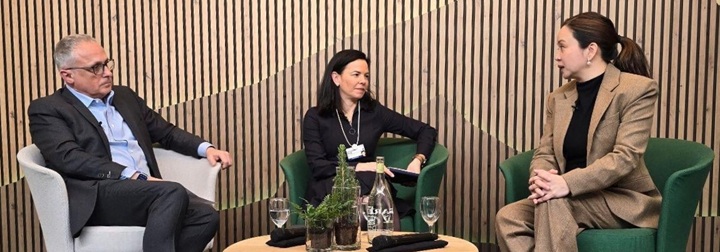 |
| (L-R) Deloitte Global Financial Services Industry Leader Neal Baumann, Banco Santander North America Regional Head Christiana Riley, GCash Chief Strategy Officer Rowena Zamora (Image Source: Orange Magazine TV/GCash) |
GCash, the Philippines’ leading finance super app and largest cashless ecosystem, recently highlighted the role that fintech and emerging technologies such as artificial intelligence (AI) play in creating value for countries like the Philippines at the recent World Economic Forum (WEF) Annual Meeting 2025 in Davos, Switzerland. GCash President and CEO Martha Sazon, in a session entitled “Leaving Asia’s Comfort Zone” explored the potential of emerging technologies in driving economic growth. She highlighted how GCash has been working toward increased financial inclusion, in collaboration with the Philippine government and other industry partners.
Highlighting the goal of GCash in ensuring the benefits of harnessed technology, Sazon stressed, “GCash has worked toward using tech, data, and customer-centricity to address societal issues. At the heart of what we do is financial inclusion.” She further underscored that true innovation creates societal impact — especially for those historically excluded by traditional banking services, saying, “Before the pandemic, the Philippines was highly unbanked, where only 29% of the population were banked. Because of the adoption of fintech in the Philippines, the banked rate has now gone up to 65%. And the rate of those with financial access is even higher.” This prompted the introduction of the first-ever eKYC (electronic Know Your Customer) process in the Philippines, followed by simplified cashless payments. Today, GCash has over 94 million users, with access to loans, investments, and insurance at the tap of a phone screen. This was echoed by GCash Chief Strategy Officer Rowena Zamora in a panel hosted by Deloitte.
“In an economy like the Philippines, where the majority of the population is unable to provide what traditional financial institutions need for them to open an account, the challenge is providing financial services to the largely unbanked or underbanked population. We’re driven by a vision that’s very simple but very difficult to achieve, which is ‘Finance for All’. The Philippines is underpenetrated in terms of financial services. It’s a country that faces many systemic challenges to inclusion, particularly financial inclusion, so GCash has focused on using technology, AI, and other similar enablers to bridge that gap,” said Zamora. The WEF Annual Meeting 2025 also placed the spotlight on AI with leaders from governments and businesses around the world discussing at length the potential of this technology. “A big part that AI can provide is personalization which helps us tailor-fit solutions to address the issues we see in each segment. In the same way, AI can help us further earn the trust of our customers and keep our platform secure. We’ve been working with other global institutions to advance AI — not just for our customers but even internally,” said Sazon.
GCash has used AI to personalize user experiences through a robust customer relationship management system. Moreover, through GScore, GCash uses AI to determine a user’s creditworthiness based on their in-app activity. This has been groundbreaking in allowing underserved users to overcome traditional documentary requirements and even collateral to access much-needed funds. “Our customers might not have the traditional requirements, but they have a digital footprint. They make digital transactions, which we can use as a proxy for what traditional financial institutions typically require. This has enabled us to unlock over $2B (two billion dollars) for micro-loans to seven million Filipinos in the past several years. That’s quite huge in a country where credit penetration has been in the low digits. Before the pandemic, only one percent of Filipinos had access to credit,” said Zamora who further emphasized that AI adoption must come with awareness, education, and upskilling, especially at a time of increased cybersecurity threats.
WEF has recognized the significant growth of GCash. Its parent company, Mynt, recently became the first member from the Philippines of the WEF Unicorn Community, a sub-community of WEF’s Innovator Communities comprising the world’s most promising start-ups and scale-ups. Mynt’s membership is a nod to the rapid advancement of both fintech and financial inclusion in the Philippines. “We are honored to be part of the World Economic Forum Unicorns Community — representing the Philippines and its booming fintech industry. This reflects our commitment to transforming financial services in our country and contributing to global financial inclusion and innovation conversations. This enables us to engage with other leaders and explore new ways to drive positive change,” said Sazon.